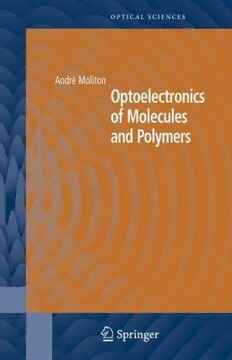Download Optoelectronics of Molecules and Polymers (Springer Series in Optical Sciences) PDF Free - Full Version
Download Optoelectronics of Molecules and Polymers (Springer Series in Optical Sciences) by Andre Moliton in PDF format completely FREE. No registration required, no payment needed. Get instant access to this valuable resource on PDFdrive.to!
About Optoelectronics of Molecules and Polymers (Springer Series in Optical Sciences)
Optoelectronic devices are currently being developed at an extraordinary rate. Organic light-emitting diodes, photovoltaic devices and electro-optical modulators are pivotal to the future of displays, photosensors and solar cells, and communication technologies. This book details the theories underlying the mechanisms involved in the relevant organic materials and covers, at a basic level, how the organic components are made. The first part of the book introduces the fundamental theories used to describe ordered solids and goes onto detail on concepts applicable to localised energy levels. Then the methods used to determine energy levels particular to perfectly ordered molecular and macromolecular systems are discussed along with a detailed consideration of the effects of quasi-particles. The function of excitons and their transfer between two molecules is studied and, in addition, the problems associated with interfaces and charge injection into resistive media are presented. More technological aspects are covered in the second part, which details the actual methods used to fabricate devices based on organic materials, such as dry etching. The principal characterisation techniques are also highlighted. Specific attention is paid to visual displays using organic light-emitting diodes; the conversion of photons into electrical energy (the photovoltaic effect); and for communications and information technologies, the electro-optical modulation of signals.
Detailed Information
| Author: | Andre Moliton |
|---|---|
| Publication Year: | 2005 |
| ISBN: | 9780387237107 |
| Pages: | 511 |
| Language: | English |
| File Size: | 25.039 |
| Format: | |
| Price: | FREE |
Safe & Secure Download - No registration required
Why Choose PDFdrive for Your Free Optoelectronics of Molecules and Polymers (Springer Series in Optical Sciences) Download?
- 100% Free: No hidden fees or subscriptions required for one book every day.
- No Registration: Immediate access is available without creating accounts for one book every day.
- Safe and Secure: Clean downloads without malware or viruses
- Multiple Formats: PDF, MOBI, Mpub,... optimized for all devices
- Educational Resource: Supporting knowledge sharing and learning
Frequently Asked Questions
Is it really free to download Optoelectronics of Molecules and Polymers (Springer Series in Optical Sciences) PDF?
Yes, on https://PDFdrive.to you can download Optoelectronics of Molecules and Polymers (Springer Series in Optical Sciences) by Andre Moliton completely free. We don't require any payment, subscription, or registration to access this PDF file. For 3 books every day.
How can I read Optoelectronics of Molecules and Polymers (Springer Series in Optical Sciences) on my mobile device?
After downloading Optoelectronics of Molecules and Polymers (Springer Series in Optical Sciences) PDF, you can open it with any PDF reader app on your phone or tablet. We recommend using Adobe Acrobat Reader, Apple Books, or Google Play Books for the best reading experience.
Is this the full version of Optoelectronics of Molecules and Polymers (Springer Series in Optical Sciences)?
Yes, this is the complete PDF version of Optoelectronics of Molecules and Polymers (Springer Series in Optical Sciences) by Andre Moliton. You will be able to read the entire content as in the printed version without missing any pages.
Is it legal to download Optoelectronics of Molecules and Polymers (Springer Series in Optical Sciences) PDF for free?
https://PDFdrive.to provides links to free educational resources available online. We do not store any files on our servers. Please be aware of copyright laws in your country before downloading.
The materials shared are intended for research, educational, and personal use in accordance with fair use principles.

